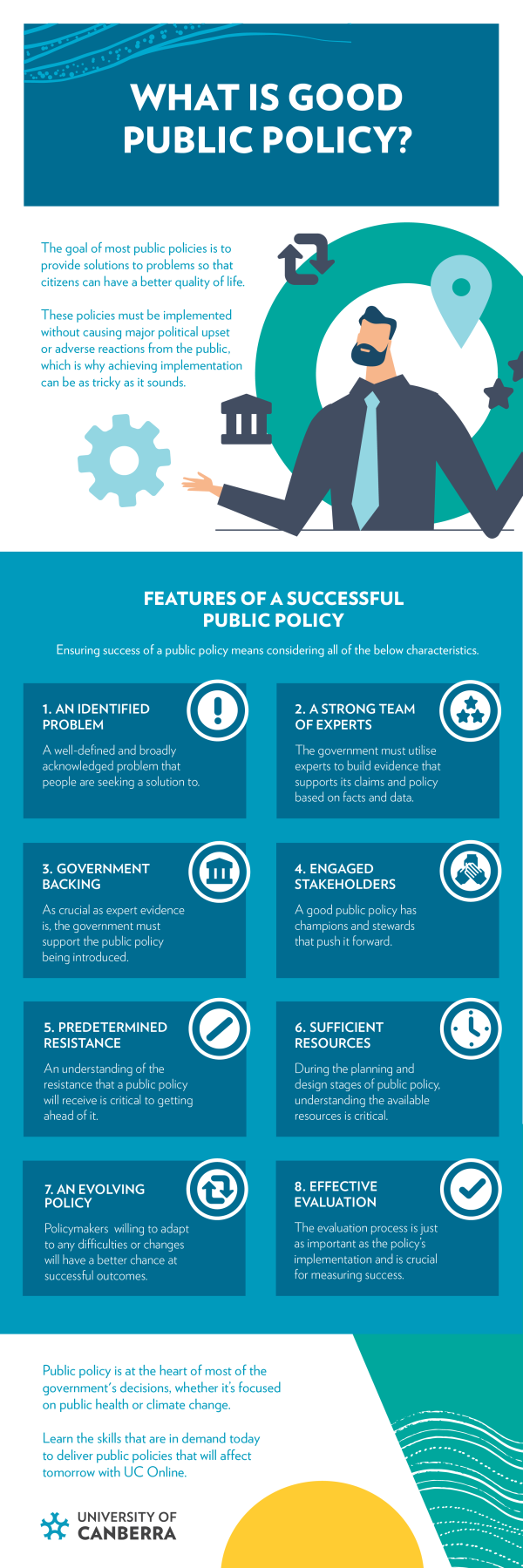What is good public policy?

Over the last century, governments have made policy decisions that impact people globally. Sometimes, these decisions have been sound; other times, they have not.
Understanding good public policy is not always straightforward, and creating good public policy requires a combination of skills, information and meticulous planning throughout the policy cycle.
Key components of a successful policy include clearly identifying a problem, consulting experts to inform evidence-based decision-making, securing government support, engaging stakeholders, anticipating resistance, ensuring sufficient resources and maintaining flexibility to adapt to challenges.
You may already understand the concept of public policy, but what is good public policy and how can you implement it? With the right education and experience, you can contribute to the public good by influencing public policy and having a meaningful impact on your community.
Defining good public policy
Good public policy has successful and measurable outcomes and solves the problem it sets out to address. It does this while alleviating political rifts or negative impacts that might arise elsewhere in society.
If policymakers can get the mix right, there’s a better chance that the policy will have successful outcomes. This is true for the development of new policies and the assessment of existing ones as well.
What is good public policy, then and what does it involve?
Here are the key elements in the planning, design, implementation and evaluation stages of successful public policy.
1. An identified problem
The problem at the crux of public policy must be widely recognised. It should be a well-defined and broadly acknowledged problem that people are seeking a solution to. This is critical to garner support from public and private stakeholders and the general public themselves.
2. A strong team of experts
The government must utilise experts to build evidence that supports its claims and policy based on facts and data.
This evidence assesses the current problem. The assessment will also include evidence-based advice about how the proposed policy implementation will help. Public policy has no integrity without reliable and factual evidence, so it’s crucial to get it off the ground.
Experts can be consulted after the problem at the core of the policy has been identified, or an expert can be the one to bring it to the attention of the government. Regardless, without facts and data presented by an expert, the legitimacy of the need for the policy will be lost.
3. Government backing
As crucial as expert evidence is, the government must champion the public policy being introduced. Not only is support from the current government needed, but a policy ideally should be strong enough that it can survive a change in government as well.
4. Engaged stakeholders
Good public policy has champions and stewards that push it forward. This is crucial at all stages of the process. There should be key players who know how to influence public policy to garner the support of the public and decision-makers.
5. Predetermined resistance
Understanding the resistance that a proposed public policy will receive is critical to getting ahead of these challenges. You should never assume that a policy will be accepted as it is without some pushback and you should always be prepared to deal with this resistance.
6. Sufficient resources
During the planning and design stages of public policy, understanding available resources is critical. It’s not enough to assume that there will be enough funding, resources or contributions from other parties – you need absolute confirmation.
7. An evolving policy
Challenges always arise when designing and implementing a public policy. Policymakers who understand this evolution and are willing to adapt to any difficulties or changes will have a better chance at successful outcomes.
8. Effective evaluation
The evaluation process is just as important as the policy’s implementation and is crucial for measuring success. This requires data from different sources to evaluate the effectiveness of the policy and whether it should continue in a particular direction.
Infographic Transcript
The goal of most public policies is to provide solutions to problems so that citizens can have a better quality of life.
These policies must be implemented without causing major political upset or adverse reactions from the public, which is why achieving implementation can be as tricky as it sounds.
Features of a successful public policy
Ensuring the success of a public policy means considering all of the characteristics below.
- An identified problem – A well-defined and broadly acknowledged problem that people are seeking a solution to.
- A strong team of experts – The government must utilise experts to build evidence that supports its claims and policy based on facts and data.
- Government backing – As crucial as expert evidence is, the government must support the public policy being introduced.
- Engaged stakeholders – A good public policy has champions and stewards that push it forward.
- Predetermined resistance – An understanding of the resistance that a public policy will receive is critical to getting ahead of it.
- Sufficient resources – During the planning and design stages of public policy, understanding the available resources is critical.
- An evolving policy – Policymakers willing to adapt to any difficulties or changes will have a better chance at successful outcomes.
- Effective evaluation – The evaluation process is just as important as the policy's implementation and is crucial for measuring success.
Public policy is at the heart of most of the government's decisions, whether it's focused on public health or climate change.
With the University of Canberra, you can learn the skills that are in demand today to deliver public policies that will affect tomorrow.
Examples of good public policy in Australia
These examples show what good public policy can look like and its impact on Australians’ everyday lives.
Murray-Darling Basin Plan
The Murray-Darling Basin Plan was implemented following a 2012 agreement recognising that the Basin needed to be protected for future generations and that its current water levels required management. The plan was developed to do this while supporting farmers and other industries that relied on the Basin.
The various strategies implemented by this policy included water restrictions, development of infrastructure, water markets and trade, as well as compliance with new water rules.
The Murray-Darling Basin Authority releases public reports of its monitoring and reporting activities.
COVID-19 pandemic
COVID-19 brought an unprecedented public policy challenge for Australia and the world.
The Australian Government introduced a range of measures to deal with the COVID-19 pandemic in 2020 and limit the rates of hospitalisation and death for its citizens.
These included economic support such as the JobKeeper Payment, support for families through childcare fee relief, expert committees, rapid antigen test distribution and a vaccine rollout.
Gun control
Australia introduced new gun laws after several mass shootings in the 1980s and 1990s.
After the Port Arthur massacre in 1996, in which 35 people were killed and 18 seriously injured, a public policy was swiftly developed to curb gun ownership. This led to the National Firearms Agreement, which banned guns, including automatic and semiautomatic rifles as well as shotguns. Initiatives like the firearm buyback program and the national firearm registry formed part of the plan.
This policy effectively got most political parties and stakeholders on board, resulting in a sharp decline in deaths and injuries caused by firearms in Australia.
Universal health care (Medicare)
Introduced in 1984, Medicare is Australia’s publicly funded universal health care system, which provides a wide range of medical services with little or no direct cost to Australians.
Medicare ensures that all Australian residents receive essential medical care, including visits to general practitioners, hospital services and some pharmaceuticals. The system is funded through taxation and contributes significantly to Australians’ overall health and well-being. Medicare has been praised for providing equitable access to health services and its role in improving public health outcomes across the country.
Carbon pricing
Carbon pricing was introduced by the Gillard Government in 2012 as part of Australia’s strategy to reduce greenhouse gas emissions and combat climate change.
The policy placed a price on carbon emissions that was meant to encourage businesses to reduce their carbon footprint. It also included provisions for compensating affected industries and supporting the development of clean energy technologies. The mechanism was instrumental in driving investment in renewable energy and promoting environmental sustainability. Although it was repealed in 2014, it set the stage for future climate policies and demonstrated the potential of market-based approaches to environmental regulation.
Why study public policy with the University of Canberra?
If you’re wondering how to start your career in public policy, studying the online Master of Public Policy at the University of Canberra is a great place to start.
Students with no bachelor’s degree but three years of relevant work experience can study the Graduate Certificate in Public Policy as an entry point into the Master’s course.
Better still, undertaking your studies with us gives you access to several unique benefits.
Flexible study format
The online study format offered by the University of Canberra gives students a more flexible path they can follow to suit their schedules. The live tutorials are delivered across the week at times that work for everyone and they’re recorded, so you can catch up on them later if you can’t make the live event.
In-demand skills
Relevant, continually modernised coursework can be applied immediately to your career. The University of Canberra has consulted with industry experts in public and non-public sectors to ensure that the units delivered are relevant to today’s policy landscape and that your skills are in demand.
Networking opportunities
At the University of Canberra, students benefit from the close relationship that the institution has with policymakers and the public sector, given their proximity to the seat of government in Canberra.
Contribute to good public policy
Effective public policy requires a delicate balance of skills, information and strategic planning. When successfully implemented, good public policy is key to addressing significant societal issues and driving meaningful change. However, upskilling is essential to creating these types of policies.
The University of Canberra’s online Master of Public Policy equips students with the skills, knowledge and network to succeed in this vital area. Find out how we can help you work toward good public policies that have a lasting impact on the lives of Australians.
Interested in learning more about specialising in public policy with the University of Canberra? Visit our website or reach out to one of our Student Enrolment Advisers on 1300 471 770.




